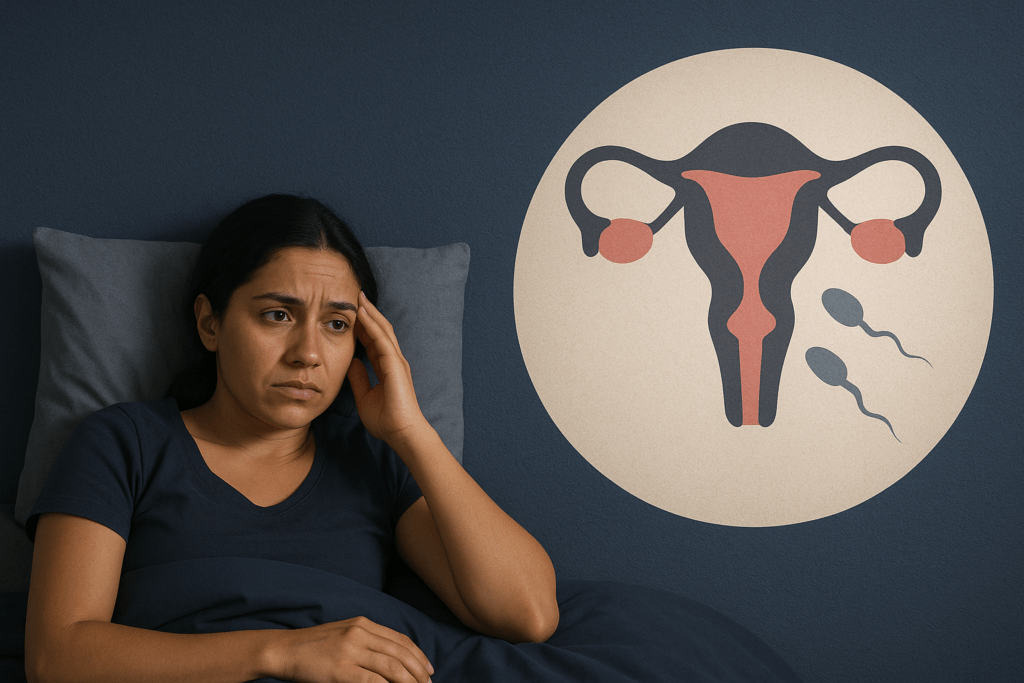Having sufficient rest isn’t merely a matter of waking up feeling revitalized — it’s also key to fertility and reproductive harmony. The busy lifestyle of today, long exposure to screens, and irregular work shifts commonly result in poor sleeping habits which quietly impact hormone health.
If you’ve ever asked yourself if fertility and sleep are related, the answer is a definite yes. The manner in which you sleep at night can play a direct role in ovulation, sperm health, and even conception.
How Sleep Affects Fertility Hormones
Sleep has a significant function in regulating reproductive hormones like estrogen, progesterone, luteinizing hormone (LH), and follicle-stimulating hormone (FSH). They control ovulation and menstrual cycles in women and sperm production in men.
When sleep is interrupted, the circadian rhythm of the brain is compromised, suppressing melatonin levels and raising cortisol levels — the stress hormone. Elevated cortisol levels can delay or inhibit ovulation, which makes conception more difficult.
In men, disrupted sleep can reduce levels of testosterone and the health of sperm. There is also evidence that side effects of late-night sleeping — like hormonal disturbance and weakened immune systems — can decrease sperm count and motility with the passage of time.
The Hidden Effect of Late Nights and Screen Exposure
Scrolling through your phone at night may appear innocent, but blue light emission from screens postpones melatonin release. Melatonin is not just a sleep hormone — it safeguards egg quality and promotes early embryo development.
Women who tend to wake up late or have irregular sleep schedules might observe alterations in their menstrual cycles or encounter trouble conceiving.
Night-shift workers are especially vulnerable because irregular sleeping interferes with circadian and reproductive hormones. With the passage of time, these alterations can lead to sleep problems in pregnancy or even complicate conception prior to pregnancy occurring.
For those undergoing IVF or IUI, research shows mindfulness reduces anxiety and improves emotional well-being during treatment cycles. In fact, women who practiced mindfulness reported feeling more hopeful, while men found it helped ease performance-related stress. Whether through structured meditation or mindful pauses in daily life, mindfulness helps couples create space for healing.
No Sleep During Pregnancy: Why It Matters
Pregnancy itself can initiate new sleep problems — ranging from hormonal changes to discomfort and frequent urination. But no sleep during pregnancy isn’t just fatiguing; it can actually raise the risk of high blood pressure, gestational diabetes, and preterm birth.
Adequate sleep helps regulate blood flow to the uterus, supports fetal growth, and maintains healthy hormone levels. So if you’re planning to conceive or already pregnant, treating poor sleep as a priority is crucial for both mother and baby.
Tips to Improve Sleep for Better Fertility
Small changes in your routine can have a big impact on your reproductive health. Here are a few fertility-friendly sleep habits to follow:
- Stick to a regular bedtime: Go to bed and get up at the same time every day to stabilize your body clock.
- Restrict blue light exposure: Steer clear of screens for at least an hour before bedtime. Use warm lighting or reading instead.
- Establish a relaxing sleep environment: Make your bedroom dark, cool, and quiet.
- Avoid caffeine late in the day: Coffee and soft drinks remain active in the system for several hours.
- Practice relaxation before bed: Meditation or slow-breathing exercises can decrease cortisol levels.
- Have light dinners: Large meals in the evenings can interfere with sleep and digestion.
These routines not only enhance sleep but also promote hormonal balance, improving your natural fertility potential.
When to Seek Help from a Specialist
If sleep is poor for weeks, or if you wake up feeling tired even after several hours of rest, it’s time to speak with a doctor. Individuals with hormonal conditions such as PCOS or thyroid issues are more likely to suffer from sleep disruptions.
A fertility doctor or sleep specialist can assess underlying factors and suggest measures such as melatonin regulation or behavioral therapy.
Chronic insomnia can also have an impact on mental health and stress levels, both of which influence fertility success. Getting help sooner increases your likelihood of conceiving naturally or through procedures such as IVF.

